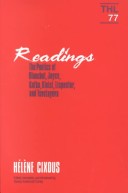Theory & History of Literature
3 total works
In this important volume Norberto Bobbio examines some of the central themes of political theory and presents a systematic exposition of his views. With great astuteness and profound scholarship, Bobbio unfolds the elements for a general theory of politics.
Bobbio's wide-ranging argument is focused on four themes: the distinction between the public and the private; the concept of civil society; differing conceptions of the state and differing ways of understanding the legitimacy of state power; and the relation between democracy and dictatorship. Bobbio's discussion draws on a wealth of theoretical and historical material, from Plato, Aristotle, Hobbes and Locke to Marx, Weber, Habermas and Foucault. By analysing the development of different languages of politics in relation to changing social and historical contexts, Bobbio deepens our understanding of the concepts we use to describe and evaluate modern political systems.
Bobbio's wide-ranging argument is focused on four themes: the distinction between the public and the private; the concept of civil society; differing conceptions of the state and differing ways of understanding the legitimacy of state power; and the relation between democracy and dictatorship. Bobbio's discussion draws on a wealth of theoretical and historical material, from Plato, Aristotle, Hobbes and Locke to Marx, Weber, Habermas and Foucault. By analysing the development of different languages of politics in relation to changing social and historical contexts, Bobbio deepens our understanding of the concepts we use to describe and evaluate modern political systems.
Vol 24
This work seeks to uncover the veiled structures of language and society that have situated women in an "imaginary zone", a zone of exclusion. It is an exploration and a dialogue between its two authors, and an exposition of Cixous's influential strategy of "ecriture feminine". Through their readings of historical, literary, psychoanalytical texts, presenting the sorceress, the hysteric, the Tarantella, Penthesileia and Cleopatra among many others, Cixous and Clement explore what is hidden and repressed in culture.
This book offers a series of striking textual studies of major literary figures and "emergent" authors. Written in an accessible, direct style the texts can be read as inspiration for Helen Cixous's fictional and critical practices. They not only introduce readers to writings from Brazil, Russia and Eastern Europe, they also give new, incisive insights into classic works such as Joyce's "Portrait of the Artist" and Kafka's "Before the Law". While the selection of texts reflects Cixous's ongoing concern with the origin of writing, with questions of love and the gift, and her insistence on pleasure, they also reveal her interest in problems of history. The juxtaposition of texts across centuries and national boundaires opens up exciting possibilities of multiple and fluid readings. Drawing on philosophy and psychoanalysis, this volume of readings can be read side by side with "Reading With Clarice Lispector" as an ongoing meditation on ethics and poetics.

